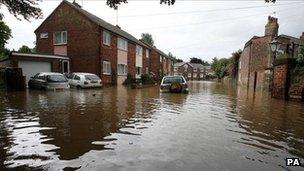New flood insurance deal needed, campaigners say
- Published

Thousands of homes were damaged by the 2007 floods
Tens of thousands of people flooded in 2007 could be left unable to insure their properties unless the government and insurers reach a new agreement.
Campaigners say the government must act quickly before a pact ensuring cover for high-risk homes ends in June 2013.
The Association of British Insurers wants the government to share the risk for the most-vulnerable properties.
The government said it was working with the industry to make sure cover would remain widely available.
The agreement with insurers, reached in 2008, obliges insurers to provide cover for high-risk properties while the government continues to improve flood defences.
Over the past four years millions of pounds has been spent on flood defences, improved drainage and better resilience.
But despite this, campaigners say insurance premiums and excesses have gone up, and unless a new deal is reached, they fear their homes and businesses will become impossible to insure and sell.
'Risk-sharing model'
Harriet Baldwin MP, whose West Worcestershire constituency was flood-hit in 2007, told BBC Radio 4's Today programme: "The government seems to be delivering that side of the bargain; it's not really being reflected by the insurance industry's reaction at the moment."
But Nick Starling, director of general insurance at the Association of British Insurers (ABI), said the current agreement had been "put in place as a piece of sticking plaster" and was "unsustainable in the long term".
Nick Starling, Association of British Insurers: "The insurance industry simply can't sustain these very high risk properties in a free market"
"It has done its business, but it has ended up distorting the market. There is a very substantial cross-subsidy from low-risk households to high-risk households."
He suggested that the provision of cover for properties at highest risk should be a job for government as well as the insurance industry.
"We are pretty unique in the UK in having household insurance which wraps up flood insurance as well," he said. "Nowhere else in the world has that, and in no other country in the world does an entirely private sector solution work for very high-risk areas.
"So we are saying that we need to make sure with government that we have some sort of risk-sharing model that looks after the couple of hundred thousand or so high-risk households."
Most in need
Judy Gibson, from the Flood Action Group, in Uckinghall, Worcestershire, spent two years living in a caravan after the 2007 floods.
She said a new flood barrier had recently been built in the area - which protects most of the houses - but she was worried she would not be able to renew insurance when the current agreement ran out.
"The agreement with the insurance companies is coming to an end in 2013. But that affects all the new policies from 2012, so it's not two years, it's one year, and that's the problem," she said.
"While the government decides what it's going to do, actually I think they'll find that the ground has been taken away from them, and that the water's rushed in."
A spokesperson for the Department for Environment, Food and Rural Affairs said: "We want flood insurance to remain widely available and are continuing to work with the insurance industry to ensure that this will be the case after the current agreement between Government and insurers expires in 2013.
"As part of these discussions, over the next few months we will consider whether there are feasible, value for money ways of targeting funding support to those most in need. We will make further announcements in spring next year."
The summer of 2007 was the wettest on record with flooding in areas including Tewkesbury, in Gloucestershire, Hull and Toll Bar, south Yorkshire.
According to the ABI, damage caused by floods in 2007 cost the industry £3bn.
- Published8 November 2011
- Published7 November 2011
- Published27 February 2011
- Published28 May 2010